
Stephen Smale is an American mathematician, known for his research in topology, dynamical systems and mathematical economics. He was awarded the Fields Medal in 1966 and spent more than three decades on the mathematics faculty of the University of California, Berkeley, where he currently is Professor Emeritus, with research interests in algorithms, numerical analysis and global analysis.
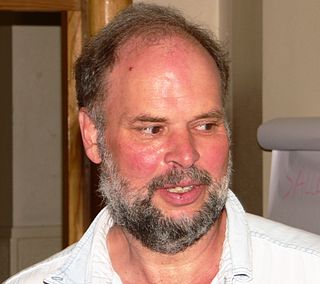
Sir Vaughan Frederick Randal Jones was a New Zealand mathematician known for his work on von Neumann algebras and knot polynomials. He was awarded a Fields Medal in 1990.

Floris Takens was a Dutch mathematician known for contributions to the theory of chaotic dynamical systems.
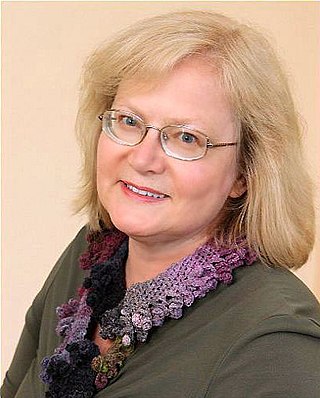
Daina Taimiņa is a Latvian mathematician, retired adjunct associate professor of mathematics at Cornell University, known for developing a way of modeling hyperbolic geometry with crocheted objects.

Dennis Parnell Sullivan is an American mathematician known for his work in algebraic topology, geometric topology, and dynamical systems. He holds the Albert Einstein Chair at the Graduate Center of the City University of New York and is a distinguished professor at Stony Brook University.

Ideas from mathematics have been used as inspiration for fiber arts including quilt making, knitting, cross-stitch, crochet, embroidery and weaving. A wide range of mathematical concepts have been used as inspiration including topology, graph theory, number theory and algebra. Some techniques such as counted-thread embroidery are naturally geometrical; other kinds of textile provide a ready means for the colorful physical expression of mathematical concepts.

Mathematics and art are related in a variety of ways. Mathematics has itself been described as an art motivated by beauty. Mathematics can be discerned in arts such as music, dance, painting, architecture, sculpture, and textiles. This article focuses, however, on mathematics in the visual arts.
Ruth Mason was a New Zealand botanist specialising in the taxonomy and ecology of freshwater plants. She was employed at the Department of Scientific and Industrial Research for 35 years undertaking research into aquatic plants, pioneering new techniques for plant preservation and collecting over 13,000 plant specimens in the field. She was awarded life membership by the New Zealand Ecological Society.
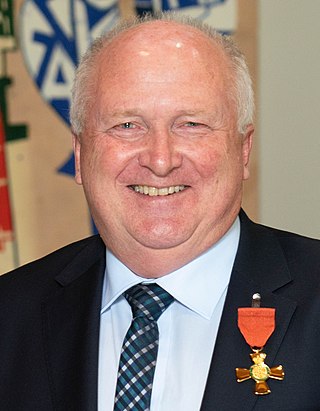
Marston Donald Edward Conder is a New Zealand mathematician, a Distinguished Professor of Mathematics at Auckland University, and the former co-director of the New Zealand Institute of Mathematics and its Applications. His main research interests are in combinatorial group theory, graph theory, and their connections with each other.
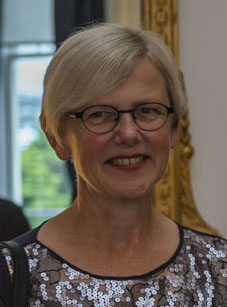
Gillian Christine Dobbie is a New Zealand computer scientist. She is a professor at the University of Auckland and the Director of the Auckland ICT Graduate School. She is also a visiting professor at National University of Singapore and on the advisory board of the Victoria University of Wellington.
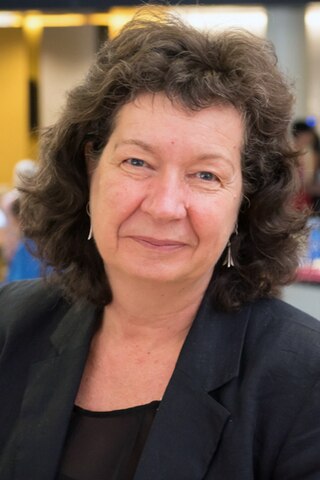
Wendy Larner is a New Zealand social scientist who has focussed on the interdisciplinary areas of globalisation, governance and gender. She has been Vice-Chancellor and President of Cardiff University since September 2023, having previously been provost at Victoria University, Wellington, New Zealand.
Marti J. Anderson is an American researcher based in New Zealand. Her ecological statistical works is interdisciplinary, from marine biology and ecology to mathematical and applied statistics. Her core areas of research and expertise are: community ecology, biodiversity, multivariate analysis, resampling methods, experimental designs, and statistical models of species abundances. She is a Distinguished Professor in the New Zealand Institute for Advanced Study at Massey University and also the Director of the New Zealand research and software-development company, PRIMER-e.
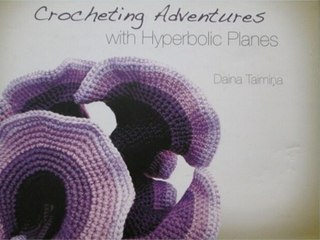
Crocheting Adventures with Hyperbolic Planes is a book on crochet and hyperbolic geometry by Daina Taimiņa. It was published in 2009 by A K Peters, with a 2018 second edition by CRC Press.

Robert Iain McLachlan is a New Zealand mathematician and Distinguished Professor in the School of Fundamental Sciences, Massey University, New Zealand. His research in geometric integration encompasses both pure and applied mathematics, modelling the structure of systems such as liquids, climate cycles, and quantum mechanics. He is also writes for the public on the subject of climate change policy.

Viviane Marcelle Joan Robinson is an emeritus distinguished professor at the University of Auckland, specialising in organisational and educational psychology.

Lynnette Robin Ferguson is a New Zealand academic, and as of 2021 is an emeritus professor at the University of Auckland. Ferguson has been a Fellow of the Royal Society Te Apārangi since 2016.
Renate Meyer is a New Zealand statistician, and is a full professor at the University of Auckland, specialising in gravitational wave analysis.
Lisa Orloff Clark is a New Zealand mathematician, and as of 2023 is a full professor at Victoria University of Wellington and Head of the School of Mathematics and Statistics. She works in the field of algebra, and also on inquiry-based learning in mathematics education.

Catriona M. O. Macinnis-Ng is a New Zealand ecologist, and is a full professor at the University of Auckland, specialising in the effects of climate change, especially drought, on plants. She has been awarded a Rutherford Discovery Fellowship, the Roger Slack Award, and the Miriam Dell Award for Excellence in Science Mentoring.
Karen Fisher is a New Zealand human geographer, and is a full professor at the University of Auckland, specialising in freshwater and marine socio-ecological systems.















